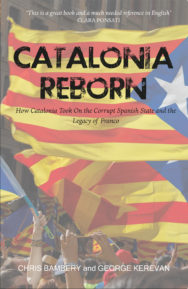‘The constitution of the Republic is a hand held out to dialogue…’
2017 saw Catalonia come under the world’s spotlight as its people voted in favour of independence in a referendum that was rejected by the Spanish authorities and the EU. In his latest book Catalonia Reborn: How Catalonia Took On the Corrupt Spanish State and the Legacy of Franco, Chris Bambery looks at Catalan history and culture as well as the current independence movement. Below he talks of the rise of Spanish nationalism.
Catalonia Reborn: How Catalonia Took On the Corrupt Spanish State and the Legacy of Franco
by Chris Bambery & George Kerevan
Published by Luath Press
And here too, in an extract taken from the book is a timeline of historical events in the region.
Classical Age – Fertile Catalan coastal region emerges as key link in Phoenician, Greek, Carthaginian and finally Roman Mediterranean trading empires.
8th–11th centuries – Islamic rule in most of Spain but Catalan border lands remain contested after Charles Martel defeats Arab-Berber armies at Poitiers, in 732 ad.
801 – Franks occupy Barcelona, creating a buffer between Charlemagne’s Empire and Muslim Spain. Catalan monasteries become major cultural centres transmitting knowledge between Christian and Muslim worlds.
870 – Wilfred the Hairy, Count of Gerona and Barcelona, unites four Catalan feudal counties, creating powerful state straddling the Pyrenees. Inward migration creates free peasantry and agricultural boom.
988 – Count Borrell ii refuses to renew oath of loyalty to the Frankish kings. Feudal Catalonia declares de facto independence.
1023–76 – Under Ramon Berenguer i, the county of Barcelona acquires a dominant economic and political position in the area.
12th century – First mention of the term Catalonia.
1137 – Catalonia and Kingdom of Aragon to the south-west unite through marriage to become the Crown of Catalonia and Aragon, though Catalan autonomy remains intact. Over the next three centuries, Catalan empire spreads across the Western Mediterranean to Sicily and Sardinia.
1359 – The Generalitat of Catalonia established, with a president and what is considered one of Europe’s earliest parliaments.
1469 – King Ferdinand of Catalonia and Aragon marries Queen Isabella of Castile, uniting the two Spanish monarchies. But Catalonia retains self-rule, with its own political institutions, courts and laws.
1474 – First printed book in Catalan.
1640–1659 – War of the Reapers: Catalan peasants rise up against the monarchy amid anger over taxation and being forced to station and provision troops fighting against France. Strengthens tradition of popular Catalan resistance to external rule.
1659 – Spain and France sign the Treaty of the Pyrenees and Catalonia loses the northernmost part of its territory.
1705 – War of the Spanish Succession: Fearful of a French Bourbon king on the Spanish throne, the Catalans ally themselves with England in defence of their traditional autonomy.
1713 – Tory government in Great Britain resolves to end the Spanish war and signs the Treaty of Utrecht. It wins trade concessions and territory, including Gibraltar. Abandoned, Catalonia keeps fighting.
1714 – Barcelona falls to the Bourbons after a 14-month siege, on 11 September – thereafter celebrated as National Day in Catalonia. Generalitat abolished and Catalan language suppressed.
1796–1814 – French Revolutionary and Peninsula War. Napoleon at first restores Catalan independence but then annexes Catalonia to France. With end of wars, absolutism renewed under Ferdinand vii.
19th century – With the loss of its American colonies, Spain enters a century of economic decline. The exception is Catalonia, where rapid industrialisation creates a new, militant working class and triggers a cultural and linguistic renaissance, reviving Catalan nationalism.
1833 – First steam-driven textile mill in Barcelona. Burned down two years later by striking workers.
1873 – First Spanish Republic declared, committed to liberalism, modernisation and federalism. Overthrown by the army the following year. Bourbons restored.
1888 – Founding (in Barcelona) of Spanish Socialist Party (PSOE) and General Workers’ Union (UGT). Universal exhibition in Barcelona.
1898 – Catalan business hurt when Spain loses Cuba. Reinforces desire of Catalan middle class for more political and economic autonomy.
1895–1906 – Zenith of Catalan Modernist architecture.
1901 – Formation of middle class Catalan Regionalist League, supporting autonomy not independence.
1909 – Working class uprising in Barcelona (‘Tragic Week’) triggered by opposition to sending Catalan conscripts to colonial war in Morocco.
1910 – Anarchist CNT founded in Barcelona.
1914 – Limited self-government returned to Catalonia under the leadership of Enric Prat de la Riba.
1917 – General strike in Barcelona.
1923 – Miguel Primo de Rivera imposes a military dictatorship in Spain. Catalan self-government and language supressed yet again.
1931 – With the collapse of the de Rivera dictatorship, Spain becomes a republic (again). An autonomous Catalan government, the Generalitat, is created under the leadership of Francesc Macia and the new Republican Left of Catalonia (ERC). Spain enters period of intense instability.
1934 – Following election of a right-wing Spanish government, new Catalan president, Luis Companys, declares independence. But this breakaway is suppressed by the army and Companys is jailed. Leftist rising in Asturias also supressed. Spain divided between left and right.
1936 – Popular Front government elected in Spain. Catalan autonomy restored under freed Companys. Franco mounts a military coup, which fails in Catalonia due to popular action. Spanish Civil War begins.
1937 – Communists and Spanish Republican government repress Catalan left-wing opposition of POUM and CNT. Andreu Nin murdered.
1939 – Barcelona occupied by Francoist forces. Catalan language banned in public, Catalan newspapers, books and culture suppressed. Thousands executed, hundreds of thousands flee into exile.
1940 – Lluis Companys executed by firing squad at Montjuic Castle.
1947 – First signs of popular resistance to Franco when Catalan used (illegally) in public at religious celebrations at Monserrat.
1951 – Tram boycott in Barcelona forces concessions from regime.
1954 – Josep Tarradellas elected Catalan President in exile.
1960s – Catalan economy revives with start of mass tourism and increasing industrialisation. Barcelona attracts large numbers of migrants from other Spanish regions. Growing cultural and political opposition to the Dictatorship led by students at Barcelona University.
1960 – Franco’s visit to Barcelona met with civil disobedience.
1962 – New strike wave leads to creation of Communist-led unions, the Commissions Obreres.
1974 – Regime executes Salvador Puig Antich, despite world-wide pleas for clemency. Mass resistance to the Dictatorship in Catalonia.
1975 – Franco dies. Juan Carlos I declared king.
1977 – First, limited democratic elections are held in Spain. One million Catalans demonstrate on 11 September. New regime allows Josep Tarradellas to return from exile.
1979 – New Statute of Autonomy for (devolved) Catalonia finally approved. Catalonia is defined as a ‘nationality’ but not a nation.
1980 – Moderate, regionalist Convergència i Unió (CIU), led by Jordi Pujol, wins the first of many elections to new Catalan parliament.
1981 – Failed military coup frightens Spanish governments into limiting autonomy for Catalonia and Basque Lands. Sets scene for later friction.
1992 – Olympics hosted in Barcelona.
2003 – Left-wing victory in Catalan elections. Massive demonstrations against Iraq War in Barcelona. Demands for greater Catalan autonomy.
2006 – New Statute of Autonomy is approved by Catalan Parliament, by the Spanish Parliament and by a referendum in Catalonia. This settlement is opposed by the Spanish right and the Popular Party.
2008 – Global banking crisis and collapse of the Spanish property bubble triggers mass unemployment in Spain and Catalonia.
2010 – Spain’s highly politicised Constitutional Court, in judgement on a case brought by the Popular Party, waters down the new Statute of Autonomy. For the first time since Franco’s death, there is a majority in Catalonia for independence.
2011 – The 15-M anti-austerity movement erupts across Spain. In Barcelona, anti-austerity and nationalist sentiments combine, undermining the traditional autonomist leadership of the CIU.
2012 – In response to the anti-austerity protests, Catalan President Artur Mas asks for negotiations on a new fiscal pact with Spain. Madrid refuses. A major independence demonstration brings 1.5 million people on to the streets of Barcelona in protest. Under pressure, Mas calls for an independence referendum. Catalan National Assembly founded.
2013 – Nearly two million people link hands across Catalonia calling for independence – possibly the largest demonstration in European history. Artur Mas asks Spanish Prime Minister Mariano Rajoy to discuss a referendum. Madrid snubs the request.
2014 – The Catalan Government holds a consultative referendum on independence. Over 80 per cent of the 2.25m votes cast favour the independence option.
2015 – Pro-independence parties win a clear majority in fresh election to the Catalan Parliament. Under pressure from the far-left CUP party, Artur Mas is replaced by Carles Puigdemont as Catalan President.
2017 –
1 October: With Madrid still refusing negotiations, the Catalan Parliament holds a second independence referendum. Despite savage Spanish police attacks on polling stations, 2,020,000 voters (91.96 per cent) answer ‘Yes’, while 177,000 say ‘No’. Puigdemont asks Madrid to enter a dialogue brokered by the EU. The Spanish Government and the EU both reject these overtures.
3 October: General strike across Catalonia in protest at Guardia Civil brutality on referendum day. Over 700,000 demonstrate in Barcelona. TV broadcast by King Filipe fails to condemn police action.
16 October: Two prominent independence leaders – Jordi Sanchez of the Catalan National Assembly and Jordi Cuixart of Omnium Cultural – arrested and imprisoned on charges of sedition.
27 October: Catalan Parliament votes to declare an independent Catalan Republic. Immediately, Spanish Senate invokes Article 155 of the constitution and imposes direct rule over Catalonia. Prime Minister Rajoy dissolves
27 October: Catalan Parliament votes to declare an independent Catalan Republic. Immediately, Spanish Senate invokes Article 155 of the constitution and imposes direct rule over Catalonia. Prime Minister Rajoy dissolves
Catalan Parliament. Puigdemont and Catalan ministers escape into exile in Belgium.
7 December: Over 50,000 Catalans come to Brussels in solidarity with Puigdemont and to demand the EU intervenes in Catalonia. EU ignores.
21 December: Pro-independence parties win narrow majority in election.
2018 –
January 2018 – Three jailed Catalan independence leaders – Oriol Junqueras, Jordi Sànchez and Jordi Cuixart – file a complaint with the United Nations, saying their imprisonment in Spain breaks international law.
March 2018 – The pro-independence majority in the Catalan parliament are unable to elect Jordi Sànchez as president after the Spanish Supreme Court refused to free him from prison so he could attend the session.
A third attempt to elect a new president collapses after a proposal to install Jordi Turull was defeated by 65 votes against 64.
Spain’s Supreme Court plans to try 13 Catalan independence leaders on charges of rebellion.
April 2018 – Carles Puigdemont arrested by German police after crossing the border en route to Belgium after Spain secured a European arrest warrant while he was visiting Finland. A German court releases him on bail saying the charge of violent rebellion was inadmissible.
Seven activists from the grassroots Committees for the Defence of the Republic are arrested following their campaign of non-violent civil disobedience.
Hundreds of thousands take to the streets of Barcelona on Sunday 15 April to demand freedom for Catalan political prisoners under the slogan ‘Us Volem a Casa’ (‘We want you home’).
May 2018 – Jordi Cuixart, Jordi Sànchez, Oriol Junqueras, Joaquim Forn, Dolors Bassa, Carme Forcadell, Raul Romeva, Josep Rull and Jordi Turull remain in Spanish prisons; Carles Puigdemont is in exile in Germany awaiting trial; Clara Ponsati awaits a Scottish court decision on the validity of the European Arrest Warrant; and Meritxell Serret, Antoni Comín and Lluís Puig remain in Belgium.
Catalonia Reborn: How Catalonia Took On the Corrupt Spanish State and the Legacy of Franco by Chris Bambery & George Kerevan is published by Luath Press, priced £12.99
ALSO IN THIS ISSUE

 Between Daylight and Hell: Scotland’s Villains
Between Daylight and Hell: Scotland’s Villains
Blunderers, killers, conmen, scandalmongers, slave owners and more of Scotland’s ne’er do wells . . …

 It’s Only the End of the World
It’s Only the End of the World
‘“I owe you an explanation?” The boy’s eyes were like saucers. “When did my mum turn into Jackie Cha …













